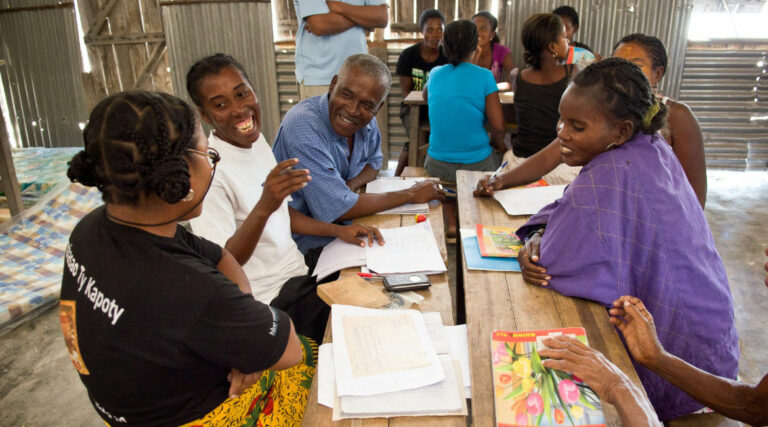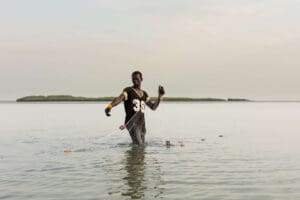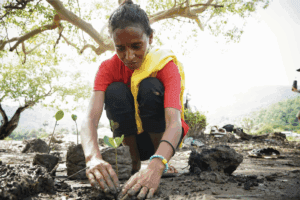A landmark meeting was held at the University of Exeter on 26 June 2013, bringing together eminent academics specialising in the evaluation of complex systems with representatives from the Population-Health-Environment (PHE) community. The aim was to explore some methods that could be used to capture the complexity of integrated PHE programmes.
Kristen Stelljes, PHE Advisor to the Packard Foundation and Ethiopia PHE Consortium, launched the meeting with an insightful overview of various PHE evaluations conducted to date. These have largely focused on measuring outcomes, with quasi-experimental studies in the Philippines and Ethiopia yielding favourable comparisons between different outcomes achieved by integrated and single-sector programmes.
Although these evaluations provide strong evidence that PHE results in better outcomes than single-sector approaches, they do not explain how or why this happens; this was the main challenge discussed by the panel. Dr Vik Mohan grounded the subsequent discussions by presenting details of Blue Ventures’ integrated PHE programme in the Velondriake area of southwest Madagascar, including current monitoring efforts and available datasets.
Presentations from Dr Robin Durie, Professor Laurence Moore, Dr Katrina Wyatt, Dr Oonagh Corrigan and Professor Rob Anderson stimulated an enlightening debate about different ways of evaluating complex systems such as integrated PHE programmes. Qualitative methods including case studies were highlighted as appropriate tools for describing the transformational changes that PHE produces in people’s lives. Realist evaluation was identified as a particularly relevant theory-driven approach for exploring how integrated PHE programmes work. By focusing on the processes through which outcomes are produced in specific contexts, realist evaluation offers a refreshingly different way of capturing the complexity of PHE. Rather than simply focusing on the end results, it provides a framework for developing and refining theories of how PHE works.
These are game-changing insights for Blue Ventures and the wider PHE community! In addition to assessing the outcomes of integrated PHE programmes, these approaches offer pragmatic and creative methods for articulating how such transformational changes are brought about. This meeting represented the beginning of an exciting collaboration between Blue Ventures and these eminent academics. Learning from this meeting is being shared both within the organisation and with the wider PHE community, as these methods promise to equip them with important new ways of telling the PHE story.
Notes for editors:
Blue Ventures is a science-led social enterprise that works with local communities to conserve threatened marine ecosystems and coastal livelihoods. Its integrated PHE programme has been operating in the Velondriake area of southwest Madagascar since 2007. Please contact Laura Robson for more information about this meeting; a detailed report is available upon request and will shortly be circulated to the Wilson Center’s PHE Policy and Practice Group. Blue Ventures proactively seeks to facilitate dialogue with other PHE organisations and interested academics in order to share best practice about evaluation approaches and collaborate as appropriate.
Paul Dieppe (Professor of Health and Wellbeing at the University of Exeter) kindly convened this meeting. Participants included Kristen Stelljes (PHE Advisor to the Packard Foundation and Ethiopia PHE Consortium), Vik Mohan (Medical Director for Blue Ventures), Rob Anderson (Professor of Health Economics and Evaluation at the University of Exeter), Katrina Wyatt (Senior Research Fellow at the Peninsula Medical School and Advisor to the Connecting Communities Programme), Robin Durie (Senior Research Fellow at the Peninsula Medical School and Advisor to the Connecting Communities Programme), Laurence Moore (Professor of Public Health Improvement at Cardiff University), Oonagh Corrigan (Senior Research Fellow at the European Centre for Environment and Human Health), Nicky Britten (Professor of Applied Health Care Research at the University of Exeter), Richard Byng (Senior Lecturer at the Peninsula Medical School), Charlie Gough (Marine Scientist for Blue Ventures) and Laura Robson (Community Health Programme Coordinator for Blue Ventures).


















